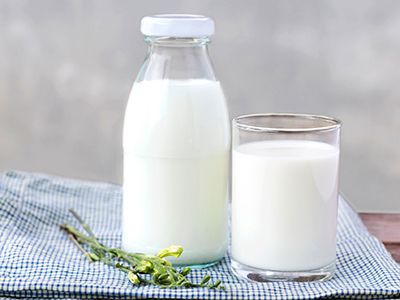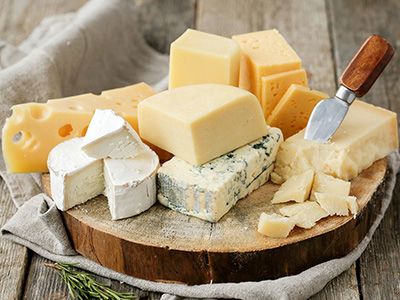Dr. Su's Blog
Can Dairy Be Part of a Healthy Diet? Part 1 of 2

To say that diets recommended for health and longevity vary widely is an understatement. Some people advocate for subsisting on juices and raw foods, while others swing to the opposite direction and claim that only a diet devoid of grains and rich in fats is appropriate. In this broad range of recommendations, one of the most frequent questions I get from patients, particularly those dealing with a cancer diagnosis, is what I think about dairy. What I don’t like about “internet-medicine” is the sweeping generalizations that occur, such as: “Dairy Causes Inflammation/Cancer!” Does it? Like most things in healthcare the answer is more nuanced than a straight yes-or-no. I do not believe that dairy is inherently bad, but let’s look at some of the variables.
When patients are questioning dairy, the first question I ask is, “How does dairy make you feel?” If eating dairy leads to increased phlegm or sinus issues, bloating, or loose bowels, then it is probably not a good food choice. It can also have an association with many other health concerns such as joint pain, acne, PMS, anxiety, or migraines. For many people, doing a short trial of dairy avoidance for 4-8 weeks (or cutting it out pre-menstrually) can make these connections clearer. If dairy leads to symptoms, usually that is a sign of inflammation or inability to process it, which we certainly don’t want.

We can also do food allergy testing via saliva or serum to assess antibodies to diary. Truthfully, I have found these tests of limited usefulness and I frequently question their accuracy and ability to create clinical change. That said, they can provide a nice “road map” for someone with persistent issues who is looking to do a more targeted elimination diet. If everything in the dairy category (butter, whey, cow milk, sheep milk, etc.) shows positive antibodies, then it is clear there is a dairy issue that is worth investigating further. The elimination-challenge diet is always the gold standard in my book, but these tests can help narrow the focus for easier compliance.
In general, many studies show that dairy acts as an anti-inflammatory food -- as long as someone does not have an allergy. This surprised me! In a 2017 study reviewing 52 clinical trials concerning dairy and inflammation, researchers found consistent anti-inflammatory activity, particularly in those with metabolic disorders (high lipids combined with high blood sugars and insulin).1 Another study from Canada looked at the question of cardiovascular risk and inflammation with dairy, and reviewed randomized controlled studies to tease out the correlations between high- and low-fat dairy and cardiovascular disease. They found “no apparent risk of potential harmful effects of dairy consumption, irrespective of the content of dairy fat, on a large array of cardiometabolic variables, including lipid-related risk factors, blood pressure, inflammation, insulin resistance, and vascular function”.2
In a small study, researchers compared consumption of cheddar cheese (Tillamook, from here in Oregon!), versus non-dairy vegan cheese made from palm oil. Both had equivalent short chain fatty acid content, which is theorized to cause elevation of blood lipids. Both foods showed an increase in post-meal increases in triglycerides, and in those with metabolic disease the triglycerides had not dropped even after 6 hours (note that because most people eat at least every 6 hours, their triglycerides were remaining constantly high). While all other inflammatory markers (IL-6, TNFa) remained the same, in the group who ate the real cheddar cheese, their C-reactive protein was lower than those who ate the non-dairy alternative.3 This is noteworthy for those who think non-dairy cheeses are automatically healthier.

The effects of dairy were also assessed in a study out of Athens called the ATTICA study. They enrolled 3042 men and women. The study was initially powered to look at the impact of central obesity on inflammatory markers, however they were able to see correlations with certain foods as well. The researchers noted that in individuals eating between 11-14 servings of dairy a week (2 servings most days), their C-reactive protein, IL-6, and tumor necrosis factor -alpha were 16%, 5%, and 12% lower than those eating <8 servings. Apparently, those consuming more dairy had even lower levels of inflammatory markers! This tempts me to ask if these reductions were just because they ate fewer junk foods and yogurt cheese instead, or was it really the effect dairy? The study does claim have made adjustments for other potential confounders, including dietary habits.4
Just so you know, I did not “cherry-pick” these studies because they told me what I wanted to hear; they were easily accessible on PubMed by searching for inflammation AND dairy (yes, that capital AND is necessary for the best search). There is a lot more data on the beneficial effects on those with metabolic disease and dairy consumption, as well as healthy individuals.
I have to confess that these studies can make me a bit crazy to try to decipher. In the example of the review of 52 clinical trials in the study mentioned above, we do not know what the quality of the dairy was, if it was organic or conventional (obviously likely conventional)? Or the type: hard cheese, soft cheese, yogurt, or a glass of milk? Was it grass-fed? Ultra-pasteurized? Do these questions matter? I believe YES! We can look at those studies to observe large generalities, but I believe quality of the dairy plays a huge role. In part 2 of this blog I will be looking into some of these details, with a particular focus on the benefits of choosing organic. Stay tuned!
References
- Bordoni A, Danesi F, Dardevet D, Dupont D, Fernandez AS, Gille D, Nunes Dos Santos C, Pinto P, Re R, Rémond D, Shahar DR, Vergères G. Dairy products and inflammation: A review of the clinical evidence. Crit Rev Food Sci Nutr. 2017 Aug 13;57(12):2497-2525. doi: 10.1080/10408398.2014.967385.
- Drouin-Chartier JP, Côté JA, Labonté MÈ, Brassard D, Tessier-Grenier M, Desroches S, Couture P, Lamarche B. Comprehensive Review of the Impact of Dairy Foods and Dairy Fat on Cardiometabolic Risk. Adv Nutr. 2016 Nov 15;7(6):1041-1051. doi: 10.3945/an.115.011619. Print 2016 Nov.
- Demmer E, Van Loan MD, Rivera N, Rogers TS, Gertz ER, German JB, Zivkovic AM, Smilowitz JT. Consumption of a high-fat meal containing cheese compared with a vegan alternative lowers postprandial C-reactive protein in overweight and obese individuals with metabolic abnormalities: a randomised controlled cross-over study. J Nutr Sci. 2016 Feb 9;5:e9. doi: 10.1017/jns.2015.40. eCollection 2016.
- Labonté MÈ, Couture P, Richard C, Desroches S, Lamarche B. Impact of dairy products on biomarkers of inflammation: a systematic review of randomized controlled nutritional intervention studies in overweight and obese adults. Am J Clin Nutr. 2013 Apr;97(4):706-17. doi: 10.3945/ajcn.112.052217. Epub 2013 Feb 27.

Meet Dr. Su!
Dr. Susan Saccomanno, ND, LAc is a contributing writer to the Mederi Blog and a practitioner at the Mederi Center Clinic in Ashland, Oregon. She has over a decade of experience as a family physician with a specialty in holistic cancer care and chronic illness. Dr. Su has been practicing at the Mederi Center since 2014, where she blends the best of naturopathic and Chinese traditions.
Dr. Su became a doctor out of her passion for helping people achieve vibrant health. She received her Naturopathic Doctorate and Master of Oriental Medicine degrees from National College of Natural Medicine, and extended her studies in integrative cancer care in the Eclectic Triphasic Medical System (ETMS), founded and taught by Donnie Yance.


